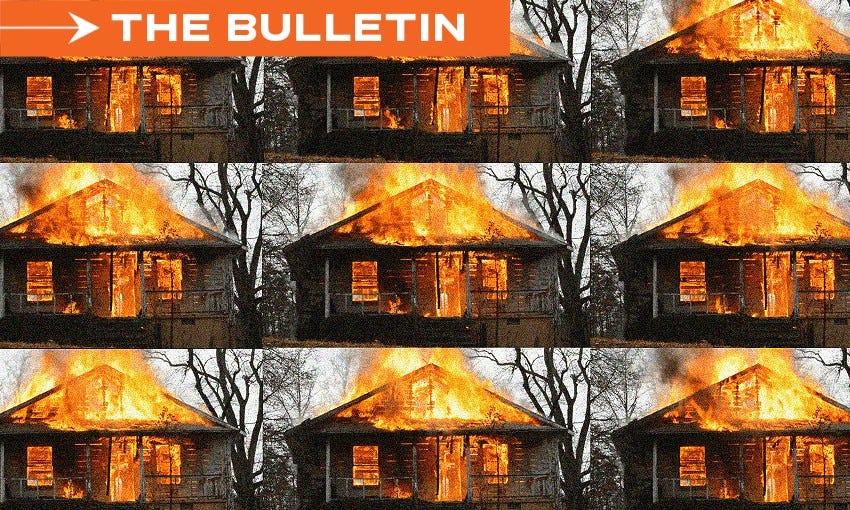The ‘self-perpetuating downward spiral’ in our mental health system
Plus: Fast track projects released, but critics remain unimpressed.
Mōrena, and welcome to The Bulletin for Monday, October 7.
In today’s edition: The government has finally unveiled its list of “fast track” projects, unanswered questions after Navy vessel capsizes, and is there a case for Wellington’s “long tunnel”?
But first: In this week’s Cover Story, The Spinoff’s Gabi Lardies looks at how people who need mental health help can end up in destructive cycles and prison.
Prison or nothing
The latest in our Cover Story series comes from staff writer Gabi Lardies. It’s a hard, but incredibly timely read.
I asked Gabi why this story was an important one to tell.
Mental health is no longer a taboo topic, but it is often spoken about in its mild forms – for example, depression and anxiety. This story is not that. This story is about illness that severely determines someones life when not managed properly.
Below, find the introduction to Gabi’s piece. I recommend you click through and read the full piece. Then, come back and find the rest of your daily news fix further down.
The house was on fire. Electronics melted; flames engulfed the walls and turned furniture into piles of charred wood and ash. Children had grown up in this house. Thick, dark smoke gathered around the ceiling. Family had visited, had meals together.
Students at the high school next door saw the flames lick the windows. The fire brigade was called, but when they arrived, a man in his 50s came out of the house wielding a knife. So the police were called, too. The man did not do as they asked. He was tasered, arrested and taken away.
It was June 2019, and it wasn’t the first time the police had been called to deal with this man. His daughters felt like life was stuck in a loop. A few years before the fire, he’d gone into an uncontrollable rage, attempting to stab a visitor in that same house. He was admitted to a mental health unit for a few days, where it came to light that he’d been hearing voices, and that his meth smoking was inducing psychosis. Trauma from his past was materialising in the present. He was given medication that made him soft and docile, and with a prescription to keep paranoia and aggression at bay, he was released.
For a while, he would take his medication and everything seemed fine. His wife worked and took care of him, and he cooked. According to his daughters, he was a good cook. Then he stopped taking his medication because he didn’t realise or believe he was sick. Psychosis returned. When aggression came, and it always did, the family would call the local DHB’s mental health crisis team, pleading for help.
At first, mental health support workers would come to the man’s house and persuade him to take his medication. He learned how to assure them that he would, so that they would leave. He became skilled in feigning compliance and good mental health, but his episodes grew worse.
His daughters would plead with the crisis team members to admit him into care, but they didn’t believe he met the threshold for compulsory treatment under the Mental Health Act. They said they couldn’t intervene because he was not an acute danger to himself or others. When his daughters said the danger was acute, they were told to call the police. The police would tell them to call the mental health crisis line. He fell into gaps within, and between, the systems.
And then, the fire.
Join us on Halloween: Live podcast recording
We’re huge fans of local television here at The Spinoff, and for one night only we want to celebrate some of our all-time faves. Join Alex Casey, Kura Forrester, Rhiannon McCall, Stewart Sowman-Lund (yes, me!) and Lyric Waiwiri-Smith at Q Theatre on October 31 as we unearth some beloved TV gems and argue for their place in our history.
Fast track projects confirmed, critics still unconvinced
The government has finally unveiled its list of “fast track” projects, with 149 proposed infrastructure developments plucked from over 340 applicants. These are the projects that will be baked into the government’s controversial “one stop shop” bill, meaning they could be progressed quickly and without public scrutiny once the law is passed.
Stuff’s Glenn McConnell has details of all 149 projects here, including 19 mines and quarries, hundreds of kilometres of new roads and railway, and a possible upgrade for Auckland’s Eden Park stadium. Among the list, writes Newsroom Pro’s Fox Meyer (paywalled) are several so-called “zombie projects” that have previously had consent applications rejected but been revived in the legislation – these included a salmon farm offshore near Bluff and a seabed mining operation offshore at Taranaki. There’s also mention of the “long tunnel” that would allow traffic to bypass Wellington city but cost billions to construct, as The Spinoff’s Joel MacManus looks at this morning.
Critics, including the Labour Party, have slammed the fast track list for a lack of environmental protections, reports RNZ’s Anneke Smith. There is concern the projects will cause environmental damage without proper oversight (though the Environmental Protection Agency will have sign off after the bill becomes law).
While acknowledging the controversy surrounding some of the projects, The Post’s Luke Malpass writes that there is a “bit in fast track for everyone” in a column today that argues the bill is the centrepiece of the coalition government’s first term.
Inquiry to determine what caused $100m Navy ship to capsize
There remain many unanswered questions surrounding the capsizing of HMNZS Manawanui after it ran aground off the coast of Samoa yesterday morning. The $100m naval ship is the first to be lost during peace time, reports Stuff, and was carrying 75 people onboard at the time it sunk. Everyone was safely rescued and the actions of commanding officer Yvonne Gray have been widely praised, explains The Post’s Justin Wong.
A court of inquiry will be held to determine what happened, reported the Herald, with Navy chief Garin Golding telling a press conference yesterday it was too early to know whether mechanical failures or human error had any part to play in the disaster.
Defence minister Judith Collins, who did a good job fronting on the incident yesterday afternoon, is on the morning media round today. At the time of writing, she’s due to speak with Newstalk ZB’s Mike Hosking shortly.
Listen: Digging deep through the government’s big targets
Deputy editor Alice Neville joins Madeleine Chapman on the latest episode of Behind the Story to discuss OIAs, wading through document dumps and making government speak accessible. Alice spends most of her time editing other writers’ work but when she does find time to write, she dives deep. Three weeks ago, we published a longform feature from Alice headlined “Inside the government’s beleaguered bid to reduce violent crime”. It detailed the many complicated layers in the government’s violent crime target, and walked us through why a simple target isn’t so straightforward.
This week, she followed up by reporting on the details that weren’t included in the government’s recent updates. Including that the vast majority of additional violent crime victims in the latest survey were women, and the connection between financial stress and violent crime.
Listen below or wherever you find your podcasts.
Click and Collect
The government has renewed its call for a ceasefire in the Middle East on the anniversary of the October 7 Hamas attack.
The migrant worker whose allegations of exploitation may have torpedoed the political career of Green MP Darleen Tana says he feels disillusioned by the justice system.
For BusinessDesk subscribers, Dileepa Fonseka has a great column arguing why tax cuts are not the “electoral boon” they once were. (paywalled)
Is this the most impressive select committee submission ever?
AI company one step closer to charter school status. (Newsroom Pro, paywalled)
As someone who routinely watches parliament’s question time, I enjoyed this little peek behind the curtain from RNZ at how party questions are vetted.
Why is Ozempic – the “miracle” weight loss drug – still not available in New Zealand?
For The Spinoff Essay, guest writer Jackie Lee Morrison writes on language and identity. Alex Casey meets the Southland principal who wrote and directed a feature length fantasy epic starring the whole school. John Campbell reflects on his proudest career moments in this week’s My Life in TV. Jenna Todd responds to Kataraina, the sequel to Becky Manawatu’s award-winning first novel Auē. Big Fan mentor Matthew Young and mentee Jared Frost share their perfect weekend playlist.
That’s it for this morning, thanks for reading. I’ll catch you back tomorrow.
Want to get in touch? Join the conversation in the Substack comments section or via email at thebulletin@thespinoff.co.nz if you have any feedback on today’s top stories (or anything else in the news).
If you liked what you read today, share The Bulletin with friends, family and colleagues.

















🧐 So Bishop has reinstated $$underwriting house building projects that Kainga Ora was underwriting until the new govt told them they were naughty boys/girls & pulled the plug on their budget for doing what they were set up to do - get more houses built? And re-animating projects that have been through the Courts & found wanting either environmentally or legally? 😱
Yes, our Mental Health system is broken - more trained workers & more resources & continuing to respond along with Police is the way forward if you take learnings from overseas - unforgiveable that effectively reducing Health funding will negatively affect even the minimal resources Aotearoa already has available - so short sighted to ignore that the ambulance at the top of the cliff is not only better for the patients, their families, and the community, but since they are stuck on $$$ a sensible govt knows it is CHEAPER than dealing with the damage to all by being at the bottom of the cliff, or in many cases - completely out at sea 🤬
I would have thought that Jack Tames fact-check of Nicole McKee claims would have a headline today.